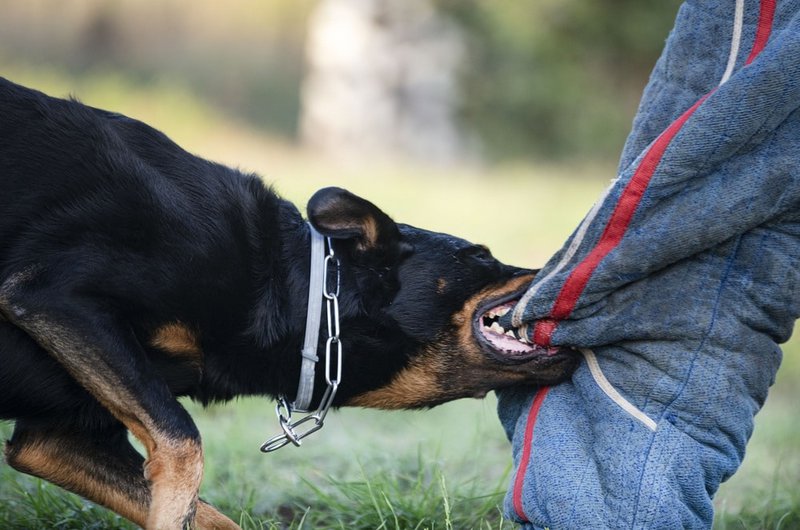Whenever most people hear about dog bites, one of the first visuals that come to mind is that of a vicious dog attack. The next worst thing is probably the image of torn-up furniture or shoes after your dog had a chewing spree.
Understanding why dogs bit is very important as a pet parent as it prepares you for a lot of challenges and risks of raising a dog.
Dogs bite mainly out of the instinctive drive. Whether the instinct is to protect themselves or guide you as their flock, the habit is as much subconscious as it is intentional.
We shall discuss a bit more on why dogs bite, why it should be discouraged, and most importantly, how you can put an end to this terrible habit. Without further ado, here is all you need to know about biting as a habit in dogs.
Why Do Dogs Bite?
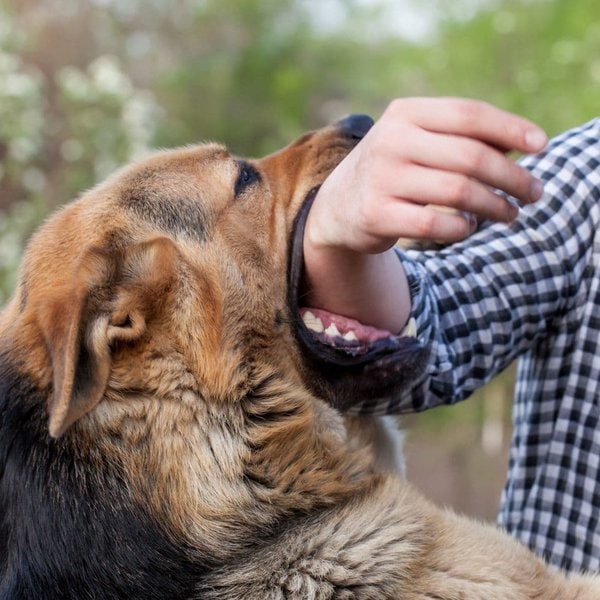
More often than not, dogs bite as an instinctive reaction to something in their environment. The stimulus could be something positive that made them excited or something negative like a perceived threat.
Below are some of these triggers that could cause your dog to display biting behavior.
Psychological Distress
Psychological distress in dogs can be anything from depression in dogs to separation anxiety. It usually results in reclusive behavior with aggressive outbursts towards non-threatening individuals or objects.
In addition to biting, a psychologically distressed dog may be withdrawn, resistant to handling, and very vocal.
Playfulness
Sometimes, dogs bite out of love and playfulness. These bites are usually gentle. However, larger dogs or puppies that don’t know their own strength could inflict injuries with their playful love bites.
Aggression
Dogs with violent tendencies may bite as a way to attack. These bites can be life-threatening, especially from larger dog breeds or from small-medium dog breeds with a powerful bite force.
Dogs biting out of aggression may also display other signs like growling, snarling, scratching, and pouncing.
Self-Defense
On the flip side, your dog could be biting as a way to defend themselves and not necessarily as the aggressor. They do this to protect themselves and/or their territory from anyone or anything they see as a threat.
These bite attacks are more often than not directed at strangers or other pets that the dog may come into contact with.
Herding Instinct
This is common in herding dog breeds like the German Shepherd and Australian Cattle Dog. Back in their herding days, they would nibble at the heels of cattle and sheep to get them to move in one direction.
This instinct is sometimes retained, and you may find your dog nibbling at your feet in a determined manner as they try to guide you towards something.
Teething Discomfort
Teething can be a very uncomfortable experience for puppies. They get a lot of relief from chewing and biting, in which case your hand or your guest’s leg is just as good of a chew toy as any other item they can get their jaws on.
Why Do Dogs Bite Their Owners?
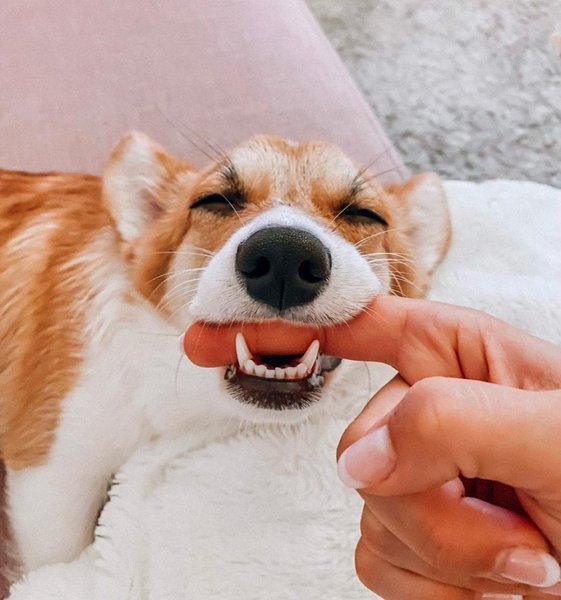
Dogs sometimes bite their owners, but this is most likely due to innocent reasons like playfulness or herding instincts. As a result, the bites tend to be harmless as the dog is not trying to defend itself or launch an attack.
Dogs could also bite their owners in reaction to being handled or petted. This often happens with dogs that have a traumatic past where they feel the need to constantly defend themselves from other animals or abusive owners.
Is It OK To Let Your Dog Bite You?
It is never a good idea to let your dog bite you. This applies whether the biting is aggressive or part of the playfights that you have with your pooch.
For a better idea of why you shouldn’t encourage the behavior, here are some of the worst possible outcomes you can expect from your dog’s biting habit.
Infection
Dog’s mouths are typically full of pathogens, including some bacteria with flesh-eating properties. Once the dog bites you, they not only break the skin leaving it vulnerable to infection but also inoculate the area with an unhealthy dose of bacteria to get things started.
Dog bite wounds may also be a conduit for conditions like rabies, especially if they are from unvaccinated strays.
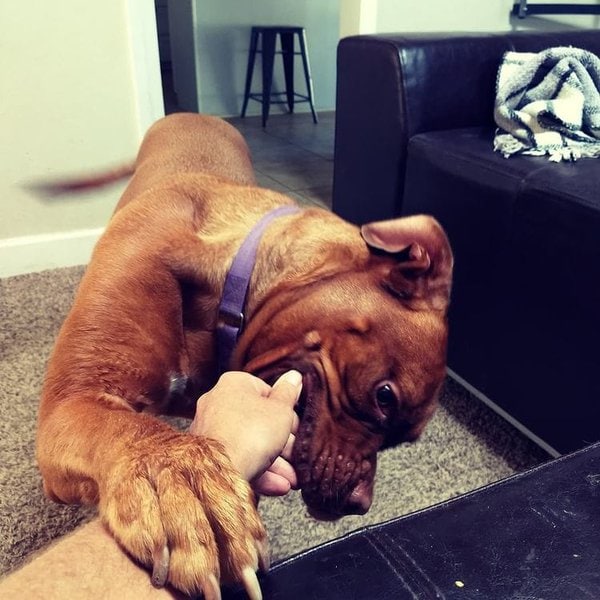
Bleeding
If your dog’s teeth hit the right or wrong spot, you may end up with an injured major blood vessel. This is common with bites to the thigh, neck, face, or arms.
If the bleeding is severe and not addressed promptly, you may end up with possibly fatal hypovolemic shock.
It Can Turn Into A Bad Habit
Allowing your dog to keep biting or nibbling at you is also a terrible idea as they may end up assuming that you are alright with it.
This puts other people who may visit your home or meet your dog outdoors at risk of getting bitten and either bleeding out or suffering infections.
How Can I Stop My Dog From Biting?
If you want to stop your dog from biting, you need a combination of wise reactions and prevention through training. Let’s take a closer look at some tips you could apply to help you stop your dog from biting, whether playfully or aggressively.
Be Calm
If your dog bites you when they are agitated or nervous, the best way to react is to compose yourself calmly yet firmly.
Avoid overreacting and doing so aggressively as you will only agitate the dog further and put yourself at an even bigger risk. This means no hitting or shouting at your dog, no matter how hard they bite you.
Discourage Playful Biting
Prevention is better than dealing with the problem after the fact. Therefore, if you want to avoid having to deal with the consequences of dog bites, it is best to nip the habit in the bud by discouraging playful biting early on.
If your dog starts to bite at you as you play, immediately stop playing and tell them off with a firm but non-threatening “No” command.
Also, make sure to avoid giving them your hands to play with once they start to demonstrate this habit of biting during playtime.
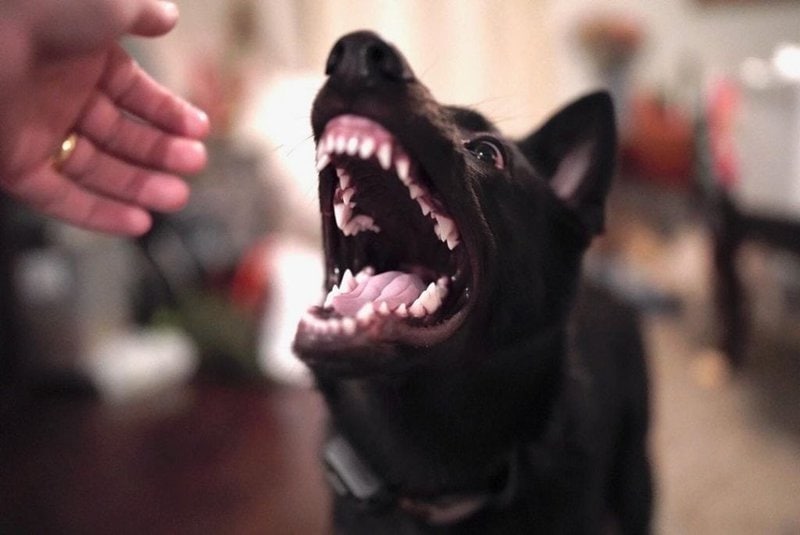
Get Them Chew Toys
For dogs biting out of anxiety or the discomfort of teething, chew toys can come in very handy when it comes to stopping the habit. The chew toys offer them a safer and sometimes more satisfying avenue to redirect all their energy.
Eventually, they will get used to the texture and avoid unfamiliar sensations like biting your clothes or skin.
Obedience Training
This will help you control your dog when they start to get aggressive or nervous and want to bite as a reaction.
It is important to appreciate that the foundation of obedience training is trust. So, take time to build a relationship with your dog as you continue to find ways to establish yourself as the leader of your own little pack.
This will make it easier for your dog to fall in line and calm down on command, thus making them less likely to launch bite attacks.
Impulse-Control Training
Dogs that bite as a part of impulsive reactions to minor triggers could benefit a lot from impulse control training. This helps them learn how to stay calm under pressure and to avoid adverse reactions like biting pounce attacks and barking.
Part of impulse control training may involve actually exposing the dog to their common triggers. This should be done in a controlled environment and preferably in the presence of a trained and experienced dog training professional.
With time, your dog will learn to control their emotions and reactions to surprise stimuli. This will come in handy with dogs that bite in self-defense even when there is no real threat.

